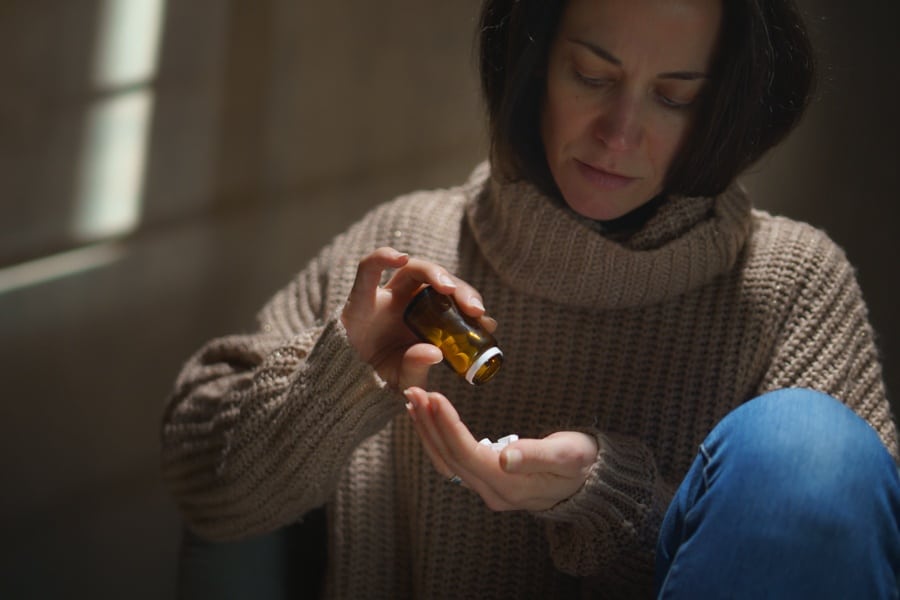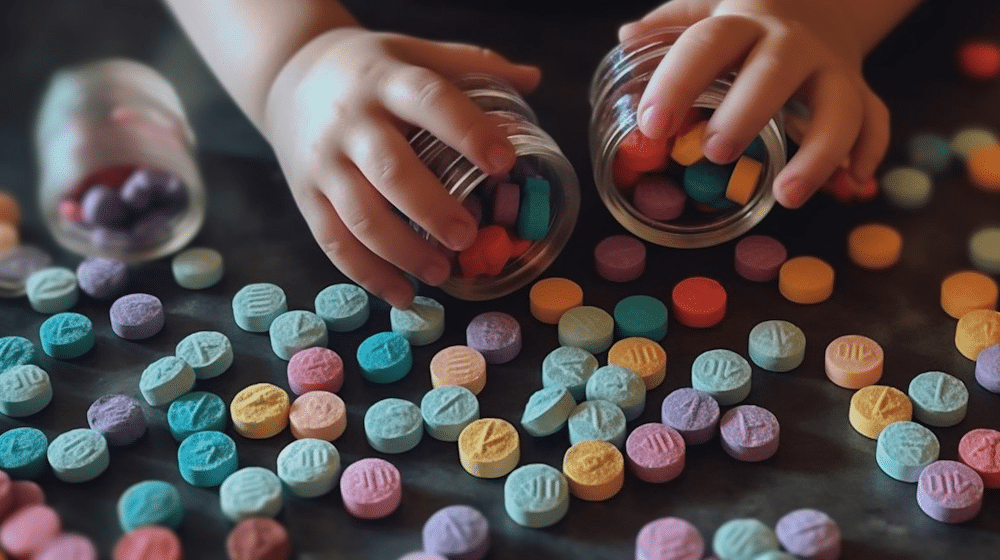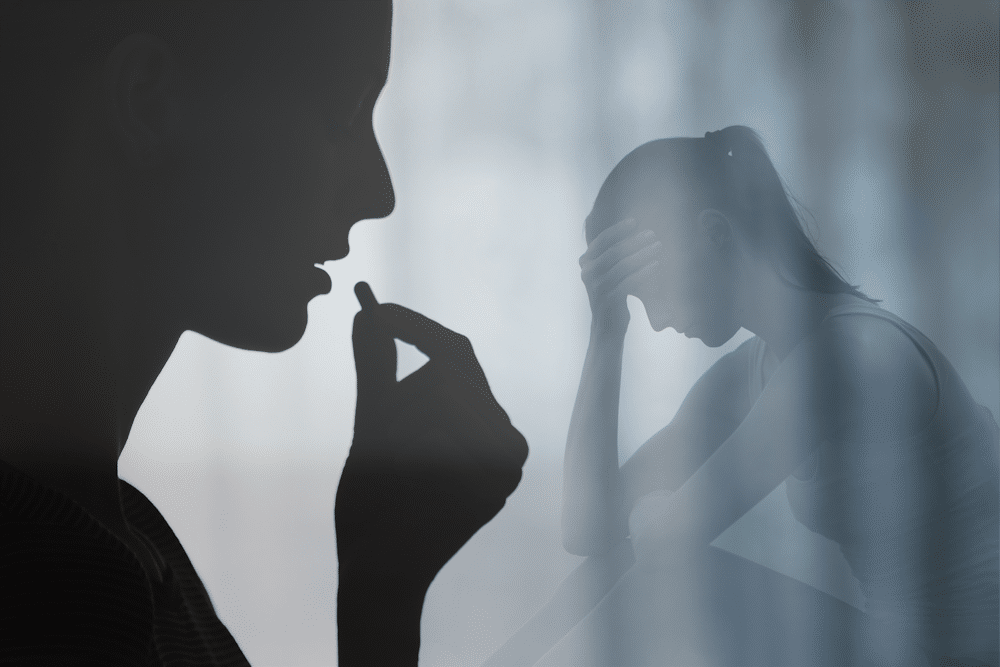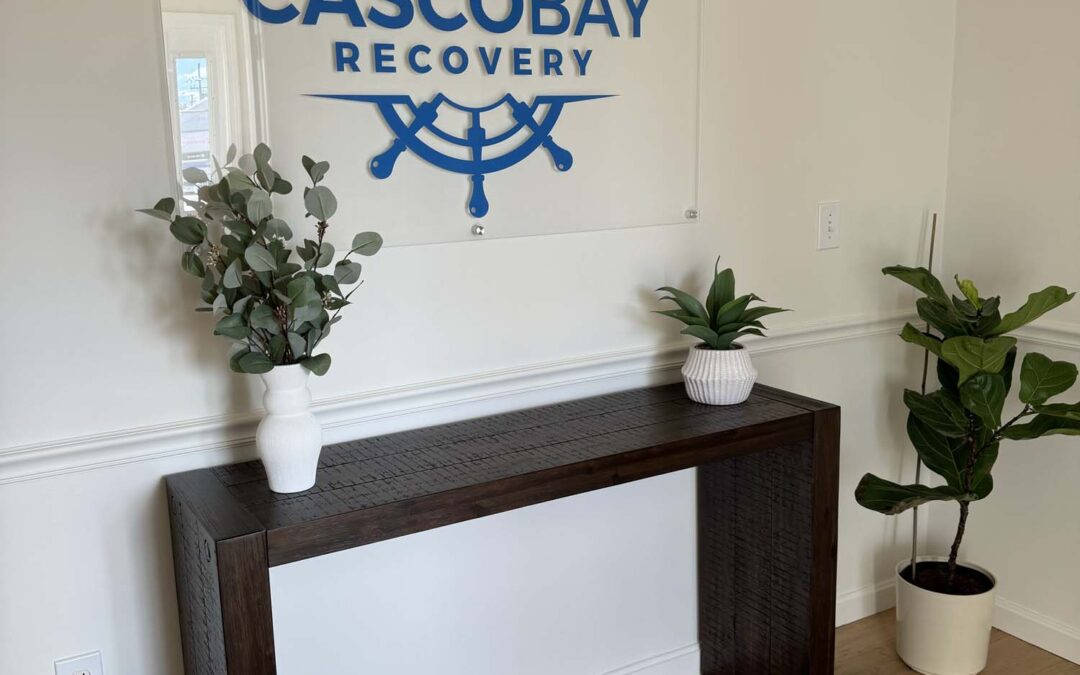Every day, people are searching for legal ways to get high. One search on the internet will give you a variety of mind-altering synthetic or man-made materials. Many convenience stores and gas stations also sell synthetic drugs labeled as “potpourri,” “herbal incense,” and other chemicals.
But how safe are synthetic drugs? What is a synthetic drug? And how do I know if a loved one is struggling with an addiction to synthetic drugs? Keep reading to find the answers to these questions and how Casco Bay in Portland, Maine can help someone struggling with addiction.
What is a Synthetic Drug?
Synthetic or designer drugs are chemically engineered compounds created in laboratories. These substances are designed to mimic the effects of existing drugs, such as illegal drugs or prescription medications, while often being structurally different from them. Synthetic drugs are typically developed to avoid drug laws and regulations or to produce psychoactive effects.
What Are the Names of Synthetic Drugs?
 Synthetic drugs encompass a wide range of substances, and new compounds are continually being developed to evade legal restrictions. As a result, it’s challenging to provide an exhaustive list of names for synthetic drugs.
Synthetic drugs encompass a wide range of substances, and new compounds are continually being developed to evade legal restrictions. As a result, it’s challenging to provide an exhaustive list of names for synthetic drugs.
Spice or K2
These are synthetic versions of marijuana. They’re much stronger and can affect the brain more than real marijuana. They make you feel high like marijuana, but they also make you feel relaxed and change how you see things.
Bath Salts
These are stimulant drugs, and they’re very powerful. Snorting them can be as strong as taking ten lines of cocaine at once. They make your heart race, raise your blood pressure and body temperature, and give you a lot of energy.
Flakka or Gravel
These contain a drug called alpha-PVP, which is a mix of a stimulant and a hallucinogen. Even a tiny amount can have a big impact. In Florida, there were lots of cases of people abusing flakka.
Smiles, 2C-I-NBOMe, and 2C-C-NBOMe
These drugs are like LSD and can make you see things differently. Even a small amount can make you feel high.
DMT, AMT, Foxy, Nexus, and Blue Mystic
These drugs can make you hallucinate, like LSD and mescaline. People sometimes use them at clubs or raves.
Molly
It’s supposed to be pure ecstasy, but often, it’s mixed with other chemicals. Only a small percentage of the Molly seized in New York had ecstasy in it. Other substances like methylone and MDPV were found instead. Molly makes you feel different, like a mix of being high and being stimulated.
What Are the Types of Synthetic Drugs?
Synthetic drugs encompass a wide range of substances, each with its own effects and properties. These drugs can be classified into several categories based on their chemical composition and intended effects.
Here are some common types of synthetic drugs:
Synthetic Cannabinoids
These are often called “Spice” or “K2” and are designed to mimic the effects of marijuana. We offer marijuana addiction treatment in Portland, Maine. These cannabinoids are sprayed onto plant material and can be smoked. Synthetic cannabinoids can have unpredictable and sometimes cause dangerous effects.
Synthetic Cathinones (Bath Salts)
These are stimulant drugs that can produce effects similar to amphetamines or cocaine. We offer cocaine addiction treatment in Portland, Maine. These drugs are often sold as white powder and can be snorted, swallowed, or injected.
Synthetic Opioids
These drugs are designed to mimic the effects of opioids like heroin or prescription painkillers. Fentanyl and its analogs are examples of synthetic opioids associated with a high risk of overdose. We offer the following addiction treatment programs:
- Heroin addiction treatment in Portland, Maine
- Fentanyl addiction treatment in Portland, Maine
- Prescription addiction treatment in Portland, Maine
- Opioid and opiate addiction treatment in Portland, Maine
Designer Stimulants
These are synthetic drugs created to produce stimulating effects, such as increased energy and alertness. They can include substances like “Meow Meow” (mephedrone) and various amphetamine analogs.
Designer Hallucinogens
Some synthetic drugs are designed to produce hallucinogenic effects similar to LSD or magic mushrooms. Examples include NBOMe compounds and 2C-series drugs.
Designer Dissociatives
These drugs produce effects like dissociative anesthetics like ketamine or PCP. Methoxetamine (MXE) and 3-MeO-PCP are examples of synthetic dissociatives.
Designer Depressants
Some synthetic drugs have depressant effects, leading to relaxation and sedation. Examples include various benzodiazepine analogs like etizolam and flubromazolam. We offer benzodiazepine addiction treatment in Portland, Maine.
Novel Psychoactive Substances (NPS)
This broad category encompasses newly created synthetic drugs that do not fit into the above categories. NPS can have a wide range of effects and include various chemical compounds.
MDMA Analogs
Compounds designed to mimic the effects of MDMA (ecstasy) are sometimes sold as “Molly.” However, the purity and safety of these substances can vary significantly. We offer MDMA addiction treatment in Portland, Maine.
What Are the Side Effects of Synthetic Drugs?
The side effects of synthetic drugs can vary widely. They can depend on the specific substance, its chemical composition, dosage, and individual factors such as overall health and tolerance.
Physical Effects
- Rapid heart rate and increased blood pressure
- Nausea and vomiting
- Sweating and chills
- Dilated pupils
- Muscle tension or spasms
- Tremors or seizures
- Chest pain or heart palpitations
- Breathing difficulties
- Dehydration
Psychological and Behavioral Effects
- Anxiety and panic attacks
- Paranoia and hallucinations
- Agitation and aggression
- Confusion and disorientation
- Mood swings
- Impaired judgment and decision-making
- Suicidal thoughts or behaviors
Cognitive Effects
- Impaired memory and concentration
- Disorganized thinking
- Delirium or psychosis
- Altered perceptions of reality
Psychiatric Effects
- Increased risk of mental health disorders such as depression, anxiety, and psychosis
- Worsening of pre-existing mental health conditions
Physical Health Risks
Overdose
Some synthetic drugs, especially opioids and stimulants, can lead to life-threatening overdoses.
Cardiovascular Problems
Increased heart rate and blood pressure can strain the cardiovascular system, potentially leading to heart attacks or strokes.
Respiratory Issues
Respiratory depression, a slowing of breathing, can occur with some synthetic opioids and depressant substances.
Kidney and Liver Damage
Synthetic drugs may harm these vital organs.
Infectious Diseases
Sharing needles or engaging in risky behaviors while using synthetic drugs can increase the risk of contracting infections like HIV or hepatitis.
Dependence and Withdrawal
Continued use of synthetic drugs can lead to physical and psychological dependence, resulting in withdrawal symptoms when attempting to quit. Withdrawal symptoms can vary but may include anxiety, depression, cravings, and physical discomfort.
Long-Term Health Effects
Limited research is available on the long-term effects of many synthetic drugs due to their relatively recent emergence. However, chronic use of these substances may have lasting physical and mental health consequences.
What an Addiction to Synthetic Drugs is Like

Addiction to synthetic drugs can be a challenging and distressing experience, much like addiction to other substances. Synthetic drugs, with their unpredictable and potent effects, can lead to physical and psychological dependence, making it difficult for individuals to quit using them.
Here are some common characteristics of addiction to synthetic drugs:
- Cravings
- Loss of Control
- Tolerance
- Withdrawal
- Neglecting responsibilities
- Health problems
- Isolation
- Continuing to use it despite the consequences
- Failed attempts to quit
- Losing interest in once enjoyable activities
Who Abuses Synthetic Drugs?
Various individuals from diverse backgrounds can abuse synthetic drugs. The people who abuse synthetic drugs are not limited to any specific demographic group, and usage can vary based on factors such as geography, availability, and social influences.
However, certain groups may be more at risk of abusing synthetic drugs:
- Adolescents and young adults
- Club and party scenes
- Individuals with a history of drug abuse
- Homeless and marginalized populations
- Prison inmates
- Individuals avoiding legal consequences
- Polydrug users
Synthetic drug abuse can affect people of all ages, genders, and backgrounds. The appeal of synthetic drugs often lies in their perceived novelty, accessibility, and the belief that they may be less likely to lead to legal consequences.
However, these substances can be highly dangerous due to their unpredictable effects and the rapidly changing nature of their chemical compositions. Effective prevention and education efforts are crucial to reducing the misuse of synthetic drugs across all populations.
What is Dependence, Tolerance, and Withdrawal Like?
The symptoms of synthetic drug dependence, tolerance, and withdrawal can vary depending on the specific drug, its potency, the duration of use, and individual factors. Synthetic drugs encompass a wide range of substances, each with its effects and withdrawal characteristics.
The following are some general symptoms associated with these three stages of addiction.
Dependence Symptoms
- Strong cravings or urges to use the synthetic drug
- A need to use the drug regularly, often escalating to daily or multiple times daily
- Spending a significant amount of time obtaining, using, or recovering from the effects of the drug
- Failing to meet personal, social, or professional obligations or responsibilities because of drug use
- Continued drug use despite knowledge of physical or psychological problems caused or worsened by its use
- Loss of interest in previously enjoyed activities or hobbies due to drug use
- Developing a tolerance to the drug may lead to increased dosage to achieve the desired effects
- Experiencing withdrawal symptoms when attempting to reduce or quit drug use
Tolerance Symptoms
- Diminished effects of the synthetic drug with the same dose or amount that previously produced the desired effects
- Needing to use larger quantities or higher doses of the drug to achieve the same high or desired effect
- The reduced duration of the drug’s effects requires more frequent use to maintain the desired state
Withdrawal Symptoms
Withdrawal symptoms can vary widely depending on the specific synthetic drug but may include:
- Anxiety or panic attacks
- Depression
- Irritability
- Agitation
- Restlessness
- Muscle aches and pains
- Nausea and vomiting
- Diarrhea
- Sweating
- Chills or hot flashes
- Fatigue or insomnia
- Strong drug cravings
- Suicidal thoughts or behaviors (in severe cases)
The onset and duration of withdrawal symptoms can also vary. Some synthetic drugs may lead to more intense withdrawal symptoms than others. Because of the unpredictability of synthetic drugs, it is crucial to enter a medical detox program to manage withdrawal symptoms.
What Are Treatment Options for Synthetic Drug Addiction?
Treatment for synthetic drug addiction, like other addictions, is a multifaceted process that aims to address the physical, psychological, and social aspects of addiction. Depending on the addiction and various other factors, your treatment plan may include multiple treatment options.
Medical Detoxification
A medically supervised detoxification (detox) program may be necessary for individuals with severe dependence on synthetic drugs. This involves gradually tapering the drug or using medications to manage withdrawal symptoms safely. Medical detoxification helps individuals through the initial stages of withdrawal, making it more comfortable and reducing the risk of complications.
Inpatient or Residential Treatment
Inpatient or residential rehab programs provide a structured and supportive environment where individuals can focus on their recovery. These programs typically offer a combination of individual counseling in Portland, Maine, group therapy in Portland, Maine, education, and holistic approaches to address addiction’s physical and psychological aspects. Depending on the individual’s needs, residential treatment can range from a few weeks to several months.
Outpatient Treatment
Outpatient treatment programs in Portland, Maine offer flexibility for individuals who do not require 24-hour supervision. They involve regular visits to a treatment facility for therapy, counseling, and support. Outpatient treatment is suitable for individuals with less severe addiction or those who have completed inpatient treatment and need ongoing support.
Cognitive-Behavioral Therapy (CBT)
Cognitive behavioral therapy in Portland, Maine is a widely used therapy approach for addiction treatment. It helps individuals identify and change negative thought patterns and behaviors associated with drug use. CBT can be effective in teaching coping strategies and preventing relapse.
Contingency Management
This approach provides tangible rewards or incentives to motivate individuals to remain drug-free and engage in treatment. It reinforces positive behaviors and compliance with treatment goals.
Motivational Enhancement Therapy (MET)
Motivational enhancement therapy in Portland, Maine is a client-centered therapy that helps individuals find motivation and commitment to change their drug use behaviors. It involves exploring personal goals and values to build motivation for recovery.
Support Groups
Support groups like Narcotics Anonymous (NA) and SMART Recovery offer a peer-based support system where individuals can share their experiences, receive guidance, and build a sober network.
Family Therapy
Involving family members in therapy can be crucial for addressing family dynamics, improving communication, and providing a supportive environment for recovery. We offer family therapy for addiction in Portland, Maine.
Medication-Assisted Treatment (MAT)
In some cases, medications may be used to assist in treating synthetic drug addiction. For example, opioid use disorder can be treated with medications like methadone, buprenorphine, or naltrexone. The choice of medication depends on the specific drug and individual needs. We offer medication-assisted treatment in Portland, Maine.
Holistic Approaches
Holistic therapy in Portland, Maine such as yoga, meditation, art therapy, and acupuncture may complement traditional addiction treatment by promoting overall well-being and stress management.
Aftercare and Relapse Prevention
Planning for an aftercare program in Portland, Maine and a relapse prevention program in Portland, Maine is essential. It may include ongoing therapy, support groups, and strategies to manage triggers and cravings.
Casco Bay Recovery Can Assist with Synthetic Drug Addiction Today

If you or someone you love struggles with an addiction to synthetic drugs, we can help them get their life back. Our treatment includes answering questions like what is a synthetic drug and how can I prevent relapse after treatment. Contact us to learn how you can start your recovery journey today.
Resources:
https://www.texasattorneygeneral.gov/initiatives/synthetic-drugs
https://www.betterhealth.vic.gov.au/health/healthyliving/synthetic-drugs






